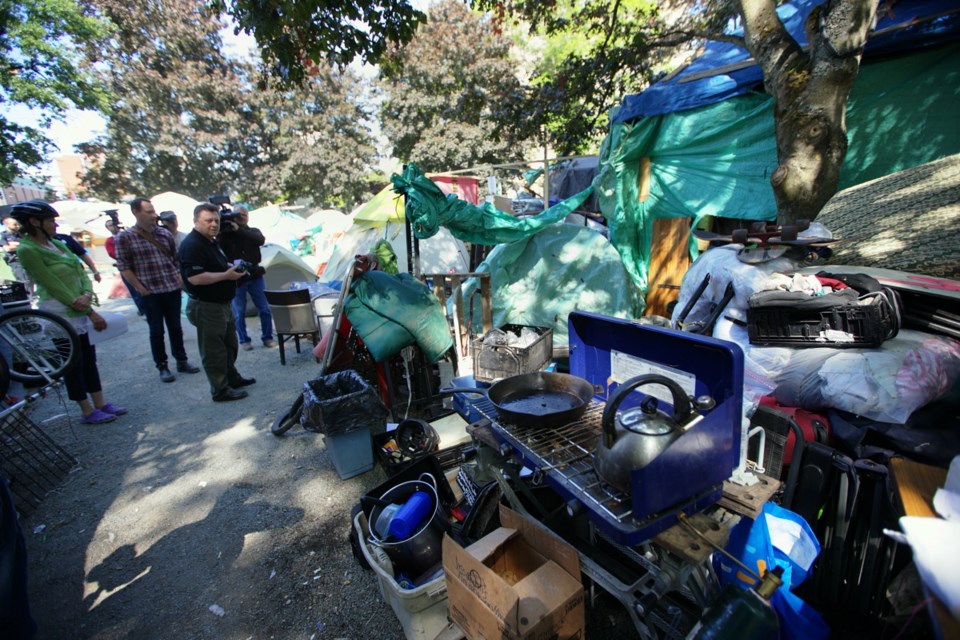The B.C. government will head back to court next week to try to evict the residents of a homeless camp at the Victoria courthouse.
Housing Minister Rich Coleman said a fire inspection this week determined that the site poses an increasing risk to life and safety.
“Obviously this is significant to us and, given those findings, the province will go back to court next week some time and ask for an injunction as early as we can possibly get it,” he said.
“It would be irresponsible for us to not try for an injunction again.”
The Office of the Fire Commissioner inspected the camp Wednesday and concluded that “there has been deterioration of the camp since the last inspection.”
The report said there are now items blocking exit paths and that structures are larger and flow together “due to flammable tarpaulins” and little or no separation between the tents.
>> Click here to read the fire inspection report
The report also notes that the excessive storage of combustibles throughout the camp appears to be increasing.
“Overall the danger to life safety created by the fire hazards is increasing and is considered to be only a matter of time before a serious fire incident occurs.”
The government failed in its previous attempt to get an injunction. A B.C. Supreme Court judge ruled in April that the residents have nowhere to move and that, by granting an injunction, the problems would simply migrate elsewhere in the city.
Coleman, however, believes the growing fire safety concerns, combined with concerns about crime and violence in the area, will bolster the province’s case.
He also said the government has options on other properties that will allow it to house anyone at the site.
”We will have a home for all these people,” he said. “So it won’t be an excuse that they have nowhere to go.
“So I would hope that the courts will . . . give us the ability to go in and once and for all to take down and mitigate this camp.”
Christine Brett, a supporter and part-time resident of tent city, said a court injunction will merely push the 120 people at tent city into unsafe situations in alleys and dark corners across the city.
“When [Coleman] thinks that that’s a safer option for people, I really hope that nobody in his family ever really needs help,” she said.
Stephen Portman of the Together Against Poverty Society, which advocates for tent city residents, also expressed disappointment at Coleman’s announcement.
“To me, it’s dangerous for the minister to be using the courts to try and solve homelessness,” he said.
But Portman took a measure of hope from Coleman’s promise of additional housing options.
“From the get go, that’s what this has been about from the perspective of Together Against Poverty Society and we’re hopeful that the housing coming online is appropriate and reasonable and meets the needs of the residents of tent city.”
Portman said there would be no need for court action if the province engaged proactively with tent city residents once the new housing comes online. “That’s what we’ve wanted from day one.”
The people who live in the neighbourhood, meanwhile, have hired a lawyer to represent their own interests in court.
“We think that the province has not shown any interest in representing the interests of the neighbours around here, so we want to make sure that our rights are protected,” said Stephen Hammond of the group, Mad As Hell Victoria.
Meanwhile, more than 100 academics and researchers issued an open letter, calling on the province to “fight the urge” to dismantle Victoria’s tent city.
The letter said the government should tackle homelessness by investing in social housing, income supports and health services.
“Tent cities are necessary spaces for many people to survive the conditions created and perpetuated by colonialism, neoliberalism and austerity policies,” the letter said.
“Super InTent City is like an economic refugee camp. We don’t close down refugee camps by attacking them with police and scattering their residents.”



